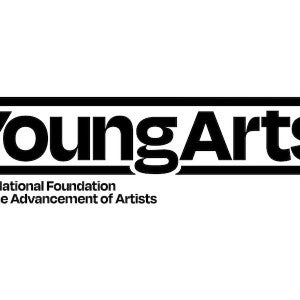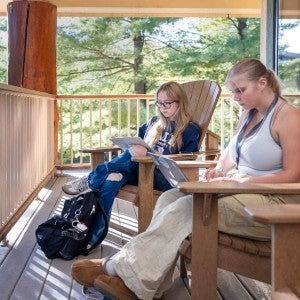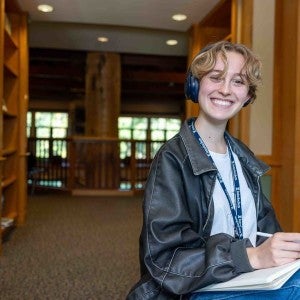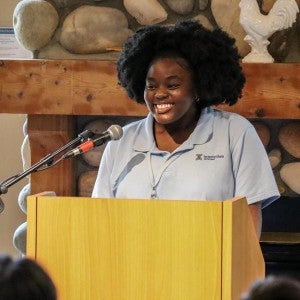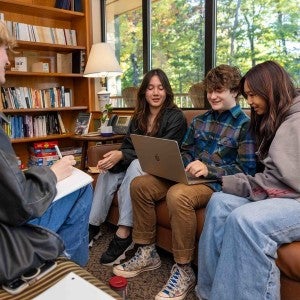Meet Megan Baxter: The Pushcart Prize-winning author shares a peek into her online writing courses
From planning first drafts to finding an agent, Baxter supports her students every step of the way.

For almost every creative writer, the big dream is the same: get published. There’s nothing like the feeling of seeing your essay printed inside your favorite magazine, or holding a proof copy of your book in your hands. If you share this dream—if you want the world to read your work—there’s no surer path to success than learning from someone who’s already done it.
Meet Megan Baxter (IAC 02, IAA 02-04), an Interlochen Online instructor and the ideal mentor for creative writers looking to build a broad readership. She teaches from experience: Baxter has published three books of creative nonfiction; garnered a worldwide readership through submitting her work to publications like The Threepenny Review and Creative Nonfiction Magazine; and even won a Pushcart Prize. She offers a glimpse into what happens inside her online courses, reveals some of the awards her students have won, and even shares a favorite writing exercise.
When did you first become passionate about writing?
I wanted to be a writer by the fourth grade. I loved to read and I had devoured so many books by that age. I thought that there could be nothing cooler than being a writer and giving other people the kinds of experiences I’d had with my favorite books. My middle school English teacher, who was a mentor to me, encouraged me to submit my application to Interlochen Arts Camp. I didn’t want to go at first—I was an obstinate, won’t-try-anything-new kind of teenager. But I got in and after one day of being on the campus, I knew I couldn’t go back to public high school. So I applied to the Academy while I was at Camp and studied creative writing here for two years.
You’ve been very active in the literary world, publishing several books and earning multiple awards. How does your experience translate into helping your students reach similar goals?
I believe that part of our obligation as creative writers is to share our work with other people, whether that is directly connecting with someone and sharing our manuscript or through self-publishing. But the most common path to having other eyes on our work is through the submission process, and I encourage all of my students to participate in that. Submissions and writing competitions are opportunities for writers to have their work read by a bigger audience, which is what we all want. When you win something or get your work into a journal, it always opens more doors for you in the writing world.
How do you create an authentic writing workshop experience within an online class?
As writers, much of our work is text-based, so that translates quite easily into an online setting. I treat my weekly Zoom workshops as a space where we can connect with each other on an individual level, like we're all sitting around a table. I facilitate regular Q&A’s and discussions during these sessions. Then, for the last two weeks of the class, the students get to share their work with one another. My students always really enjoy this part of the class because they get to see what everyone else is doing and hear direct feedback that helps them through the revision process and into the next draft.
How do you encourage writers to create work that truly connects with readers?
The best tool I have as a teacher is to show my students great example texts from contemporary or traditional masters of creative writing. I show my students how the masters use literary tools and what makes them effective. It’s like being a visual artist and going into a museum—if you're learning about painting techniques, you need to see how different masters and time periods have approached the landscape or the human figure. Over time, you find your own voice and style, and individuate yourself from the masterworks to create something unique. I give my students a lot of space to experiment and I encourage them to take risks and try new things.
Have any of your students achieved success in the literary world after working with you?
I've had students win national competitions for young writers, including YoungArts, the Scholastic program, the Adroit Poetry Prize and mentorship programs, and the Davidson Fellowship. One of my students won the Oxford Flash Fiction New Voice Prize as a 15-year-old competing against writers of all ages from around the world. I've also had students who, based on the power of their writing portfolios as well as their academic performance, have earned full ride scholarships to Oxford or to Princeton. I help students who are writing for the elementary school age bracket get their work into publications like Stone Soup and Cricket. With my adult students, I spend quite a bit of time coaching them through the pitch process and teaching them how to get agents. And several students from my memoir writing classes are very close to publishing their books.
What’s one of your favorite writing exercises to give students?
I’ve found that the simplest exercises often end up producing the most impactful creative sessions. For example, to explore the idea of setting, I’ll ask students to list a description of every sense they experience in a particular place. What do you smell or taste or feel? What do you hear? What do you see? It helps students appreciate the idea of setting as more than just a stage, but as a reality they can bring to life.
I also teach my students how to do pre-writing and brainstorming, which helps tremendously with that feeling of trepidation we all have about the blank page. You can use a variety of organizational tools to help you feel a little bit more put together when you get to that first draft. You can start with a timeline, a plot outline, or even a character development sheet that you can reference as you move forward. My students find that to be incredibly helpful.
How do you stay connected to your students after the class is over?
Almost half of my students and I maintain some kind of connection after the course has ended. Sometimes I keep in touch as things progress in their work, or they connect with me through Interlochen Online’s private lessons. That way, I can individually coach them as they work through longer drafts. Some of my students have worked with me for up to four years, and I’ve watched them grow so much over that time period.
But, whether or not they sign up for one-on-one lessons with me, it’s my joy as an instructor to be a mentor to my students even when the class is over. Some of my students have gone on to find success at Arts Academy—like Seal Kirtley, who won the Virginia B. Ball Creative Writing Competition and earned a full ride scholarship to the school. And writing letters of recommendation or helping a student navigate the college application process is always rewarding to me.
Interlochen Online is a year-round source of expert online arts education, offering opportunities for children, teens, and adults to develop and nurture their artistic abilities. Whether through four-week courses, certificate programs, or private lessons, you can experience Interlochen’s world-renowned training in an online environment that fosters creativity, confidence, and collaboration. Learn more about Interlochen Online.
How does Interlochen Online work? Start a free course demo.
✔ | Expert Faculty Receive direct, personalized feedback from a professional artist. |
✔ | Real Growth Develop artistic skills that are important to you in 30 days. |
✔ | Collaborate Connect with peers and instructors on your projects—or just for fun. |
